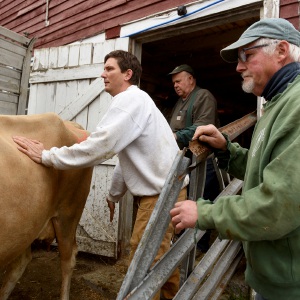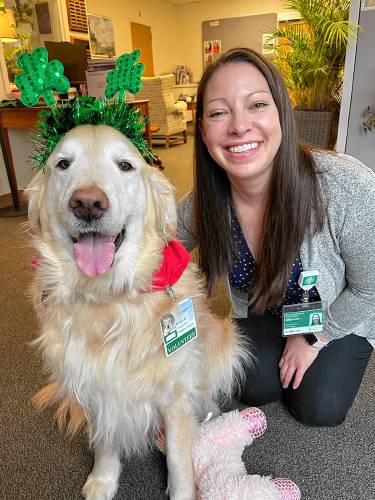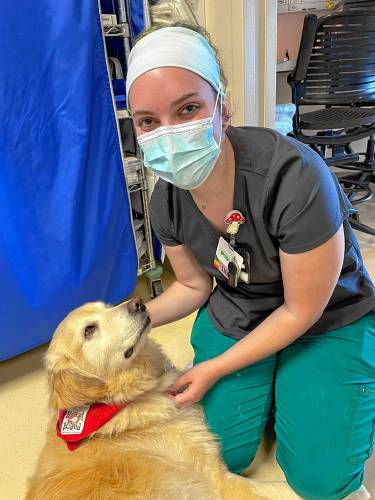Enterprise column: Dartmouth Hitchcock’s pet therapy, canine greeter programs try to take stress out of hospital stays
| Published: 04-15-2024 2:15 PM |
Walk through the main atrium of Dartmouth -Hitchcock Medical Center on a Friday afternoon and you may meet one of Dartmouth Hitchcock’s best-loved therapists doing his rounds. His name is Kooper, an 8-year-old golden retriever wh,o with his owner and teammate Karen Borgstrom, volunteers in the Pet Therapy and Canine Greeter program.
Not just any dog passes muster to be in the Pet Therapy and Canine Greeter programs. Dogs and their handlers are highly screened prior to acceptance. Marcy Sanborn, who leads volunteer services at Dartmouth Hitchcock Medical Center and the therapy dog program, said that dogs must first go through a rigorous training program. DHMC only accepts teams (the name used for the dog and handler) who have been through the certification process from Therapy Dogs of Vermont or PetPartners, a nationally recognized training program.
“Dogs must have the right temperament, and both the dog and handler must know how to navigate in a hospital setting. The certification from the training programs is just a start,” Sanborn said, adding that teams have to complete Dartmouth’s training as well. “They need to know how to navigate around hospital beds when a patient is hooked up to monitors and IVs. There are sounds and alarms that go off, and the dog cannot react.”
Kooper and Borgstrom are one of seven therapy dog teams at DHMC, and there are other teams stationed at the palliative care center and other hospitals in the Dartmouth Health system, including Alice Peck Day Memorial Hospital and New London Hospital. While new teams are encouraged to apply, Sanborn said they are not actively recruiting at this time. Also, only dogs are accepted into the DHMC program, no other animal species.
Sanborn also distinguishes between a therapy dog, who is a volunteer, and a service dog, who is a working dog trained to serve one partner only.
Kooper is a highly experienced professional, having begun his training at just 13 weeks of age.
“We knew we wanted to do therapy dog work when we were looking for puppy, so we asked our breeder for a mellow temperament puppy,” said Borgstrom, who also is a public affairs, communications and marketing senior advisor for DHMC.
Training for dogs typically starts between 6 months to 1 year of age.
Article continues after...
Yesterday's Most Read Articles
 Herd departs Hartford’s last remaining dairy farm
Herd departs Hartford’s last remaining dairy farm
 Bald eagles are back, but great blue herons paid the price
Bald eagles are back, but great blue herons paid the price
 At Dartmouth, hundreds protest ongoing war in Gaza and express support for academic freedom
At Dartmouth, hundreds protest ongoing war in Gaza and express support for academic freedom
 Kenyon: What makes Dartmouth different?
Kenyon: What makes Dartmouth different?
 A Life: Richard Fabrizio ‘was not getting rich but was doing something that made him happy’
A Life: Richard Fabrizio ‘was not getting rich but was doing something that made him happy’
But because Borgstrom knew that she and Kooper were going to enter training, she found a doggy day care for Kooper that could begin the basics right away. After completing the Therapy Dogs of Vermont program, Borgstrom and Kooper began volunteering when Kooper was 18 months old.
“I believe we are one of the longest-running teams, having been doing this for seven years,” Borgstrom said.
The therapy dog teams are directed to certain departments of the hospital based on where they can be of most service or where there may have been a request from staff or patients.
“Kooper and I often visit pediatrics,” Borgstrom said. “We also sometimes visit psychiatric inpatients or attend group therapy sessions.”
One of the places therapy dog teams participate the most is at pediatric vaccine clinics.
“Dogs are great to calm children when they are scared of getting their vaccines,” Sanborn said. “There is a natural emotional release of tension and stress when there is a dog present that is hard to put into words. You can’t translate the experience into data, but it’s invaluable.”
Kooper intuitively understands that he has to get low to the ground for young children, Borgstrom said. He visits every person in every room he walks into.
“When he sees psych patients, he figures out what they need,” she said. “Sometimes it’s just to see him or have his head on their lap or to pet him. He does what each person needs for themselves.”
Kooper doesn’t just work his magic on patients but also provides needed stress relief for staff as well.
“Anytime that I have the opportunity to bring him in, I also try to make him available to staff,” Borgstrom said, adding that the pair checks in at nurses’ stations and other offices.
Kooper was never appreciated more than during the height of the COVID-19 pandemic, when staff stress was at extremely elevated levels.
“As soon as we knew it was safe for Kooper — because when COVID first hit, we knew so little about how it was transmitted or whether dogs could pass it or have it — we tried to make Kooper available to the staff before their shifts,” Borgstrom said. “He helped to bring their stress down.”
Sometimes patients welcome dogs into their rooms in cases when they would be a little wary of people. They have a way of projecting calm.
“If someone has had a bad experience with a dog, you have to be sensitive to that person’s experience. But often that person will use the dog to overcome their fear,” Borgstrom said. “This program has been very gratifying on that and so many other levels.”
Said Sanborn of the therapy dog program: “It’s the best medicine that’s not medicine.”
Learn more at dartmouth-hitchcock.org/volunteer/pet-therapy.



 Big drop in tuition and aid is boosting Colby-Sawyer
Big drop in tuition and aid is boosting Colby-Sawyer 
